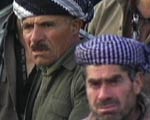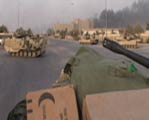 |  |  |  |  |  |
 |





 |
 |  |  
 |
| 
 |
 |  | |
FRONTLINE: The Evolution of the Bush Doctrine
The war with Iraq to oust Saddam Hussein can be seen as the first test case in the Bush administration's larger strategy for projecting U.S. power and influence in the post-Cold War world. Here's an overview of the people, the events, the major statements, and the policy battles behind what's become known as the Bush Doctrine. [From "The War Behind Closed Doors," Feb. 20, 2003]
| |
|  |
 |  | |
FRONTLINE: America's New Approach to the World
Assessments of the Bush Doctrine and its impact on international relations by John Lewis Gaddis of Yale, defense policy expert Kenneth Pollack, former Mideast envoy Dennis Ross, Mark Danner of The New Yorker, William Kristol of The Weekly Standard, and Karen DeYoung and Barton Gellman of The Washington Post. [From "The War Behind Closed Doors," Feb. 20, 2003]
| |
|  |
 |  | |
FRONTLINE: The Liberal Divide
In a Web-exclusive companion to FRONTLINE's "Blair's War," three prominent public intellectuals -- the British writer Timothy Garton Ash and the American writers Paul Berman and David Rieff -- talk about Tony Blair, Iraq, and the "liberal divide" over whether the war was justified. [From "Blair's War," April 3, 2003]
| |
|

 |
 |  | |
Interim Progress Report of the Iraq Survey Group
Full text of David Kay's unclassified interim report to Congress on the first three months of the search for weapons of mass destruction in Iraq. He concludes, "It is far too early to reach any definitive conclusions and, in some areas, we may never reach that goal."
| |
|  |
 |  | |
Remarks to the United Nations Security Council
The full text (and video) of the presentation made by Secretary of State Colin L. Powell before the UN Security Council in New York City on Feb. 5, 2003.
| |
|  |
 |  | |
"Calling Out Colin"
by Fred Kaplan
"So let us ask, one more time," writes Slate's Fred Kaplan in this look back at Colin Powell's UN briefing, "Where are the Iraqi WMD? Or, more to the point now, since such weapons will probably never be found: Why did so many -- including Bush officials, whose views on this issue, I think, were sincere, if hyped -- believe Iraq had WMD in the first place?" (Slate, Aug. 12, 2003)
| |
|  |
 |  | |
"Selective Intelligence"
by Seymour Hersh
New Yorker reporter Hersh claims the Bush administration oversold the national security risk posed by the Iraqi regime and second-guessed intelligence provided by the CIA in favor of information from Iraqi defectors who shared the administration's ultimate goal: to take down Saddam.
(The New Yorker, May 12, 2003)
| |
|

 |
 |  | |
"Nation-Building: The Inescapable Responsibility of the World's Only Superpower"
by James Dobbins
"The [Bush administration's] attempt to reverse the trend toward ever larger and more ambitious U.S.-led nation-building operations has proven short-lived," writes James Dobbins in this article, adapted from the new book, America's Role in Nation-Building: From Germany to Iraq (RAND, 2003), offering an overview of the U.S. nation-building record. "In Iraq," he observes, "the United States has taken on a task comparable in its vast scope to the transformational efforts still under way in Bosnia and Kosovo and comparable in its enormous scale to the earlier American occupations of Germany and Japan." (RAND Review, Summer 2003)
| |
|  |
 |  | |
"Democracy, Closer Every Day"
by Noah Feldman
"To see the path to a legitimate, functional Iraqi government," writes Noah Feldman in this New York Times Op-Ed piece, "one must consider the remarkable and unexpected progress being made on the political track. Since the fall of Saddam Hussein's regime in May, the Iraqis participating in organized politics have shown a maturity and unity of purpose that prewar critics would scarcely have credited." (The New York Times, Sept. 24, 2003)
| |
|  |
 |  | |
"Operation Iraqi Democracy"
by Noah Feldman
"Working with Islamic parties who profess the compatibility of democracy and Islam is good common sense. It is also unavoidable. A principled commitment to creating constitutional democracy in Iraq must be accompanied by the pragmatic willingness to let Iraqis follow the political directions they choose for themselves." (The Wall Street Journal, July 15, 2003)
| |
|  |
 |  | |
"After Iraq"
by Nicholas Lemann
Nicholas Lemann looks beyond the arguments for going to war to plans for spreading democracy -- and reconfiguring the political landscape of the Middle East -- in the aftermath. (The New Yorker, Feb. 10, 2003)
| |
|

 |
 |  | |
BBC News: After Saddam
BBC News Online offers an in-depth and constantly updated collection of news, background information, and expert analysis on postwar Iraq and the consequences of the conflict. Includes maps, timelines, and other key resources.
| |
|  |
 |  | |
BBC News: Who's Who in Post-Saddam Iraq
This section of BBC News Online's "After Saddam" coverage looks at key figures in Iraq, including the members of the governing council and leaders of Islamic, secular, Kurdish and other parties.
| |
|  |
 |  | |
The New York Times: The Struggle for Iraq
Full news coverage and in-depth background on postwar Iraq from The New York Times. (Free registration required.)
| |
|  |
 |  | |
The Washington Post: Iraq
Complete coverage from The Washington Post, including reporting and commentary, photo galleries, and an interactive feature on U.S. casualities called "Faces of the Fallen."
| |
 |
|
home + introduction + interviews + why did we go to war? + what went wrong? + what's at stake?
watch online + discussion + links & readings + teacher's guide + producer's chat
tapes & transcripts + press reaction + credits + privacy policy
FRONTLINE + wgbh + pbsi
posted october 9, 2003
photo copyright © benjamin lowy/corbis
web site copyright WGBH educational foundation
|